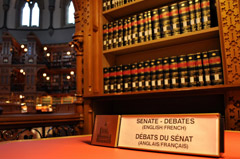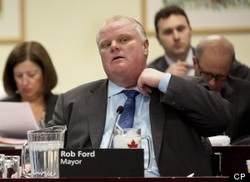
Under our constitution, Senators are "summoned" by the Governor General to serve in the Senate. In practice, this has meant that she or he receives a list of appointees from the Prime Minister of the day which is then automatically ratified and proclaimed. The result, particularly in the modern era, has been to see the Upper House get stacked with party faithful, failed candidates, and fundraisers who are beholden to one political party or another for their livelihood.
As a result, rather than an independent body, the Senate began to morph into little more than a rubber stamp of legislation on behalf of the Cabinet. Ultimately, as soon at Senate votes began to get "whipped" on partisan grounds as dictated by the government of day in the House of Commons, both of the fundamental duties of the Senate - to be an impartial, well-informed sounding board, and to protect regional interests - were lost. It simply became a redundant extension of the House of Commons, a waste of time and money.
So, from a governance standpoint, what is to be done? Luckily for us as Canadians, the three major political parties have offered us three distinct models: outright abolition; further politicization through democratizing the selection process; or, a reboot of the Senate back to its original operating parameters.
The first choice, abolition, is simple (however not "easy" constitutionally). Eliminate the Senate and you eliminate all abuses - real or perceived. Unfortunately this option conveniently ignores the original purposes of the Upper House to provide both balance and regional security. It is interesting that in the United States, the Senate has emerged as the more powerful of the two Houses as it gives equal voice to all regions of the country and necessitates regional compromises to make it work.
The second choice, democratization, is tempting. After all in the 21st century why are we talking about a 19th century appointed legislative body? The answer, again may lie to the south. Two elected Houses, working at cross purposes, could easily paralyze government. In addition, you would create a true crisis in responsible government in which the executive would need "double majorities" to remain in power. The current government came to power on a promise to democratize the Senate. Under the current constitution this is a relatively simple thing to do, in that the Constitutional Act is silent on how the list of whom is to be "summoned" by the Governor-General is created. Regional elections could be held to populate the list, as was done by Brian Mulroney when, in 1990, he recommended that Stan Waters be appointed to the Senate after he had won a Senate nominee election held by the Alberta government the previous year. In 2004, Alberta again elected a slate of nominees, one of them, Bert Brown, was named to the Senate in 2007. He has been the only "elected" Senator out of the 57 Senate appointments recommended to the Governor-General by the Harper government. Had the current government chosen to do so, by now a majority of the Senators in Ottawa would have been elected. The fact that they aren't, is a recognition of the issues surrounding democratization mentioned above.
Yesterday, the country was presented with the third option - a reboot of the original conception of the Senate. The intent of Trudeau's action was to uncouple the Senate from the political apparatus of the House of Commons. Many commentators and politicians have sought refuge in the old canard (pun intended) "if it looks like a duck and quacks like a duck, it's still a duck". And, needless to say, you can't change the political stripes of a Senator simply by rebranding. However, that is not the point. For the Senate to work the way it is supposed to, its members cannot receive their marching orders from political masters in House of Commons. Cutting those ties is a critically important step to restoring the Senate to its original purposes. If the Conservative Party were to follow suit it would give a clear message to Canadians that there is a sincere desire for change that cuts across partisan lines.
Finally, given the barriers and pitfalls inherent in both abolition and democratization, the second phase of the Liberal proposal, to create a truly non-partisan appointment process, is perhaps the most constitutionally and logistically practical path to pursue in the medium term. Couple this with an agreement on the extent to which the Senate could legitimately slow down the legislative process before the elected House of Commons had an automatic over-ride and you might have the makings of a productive compromise that would serve the country well.
When I was growing up, my high school ascribed to the Latin motto- Facta non verba - "Deeds not Words". We have talked about this long enough. I, for one, am happy that someone is actually trying to do something about it!



 RSS Feed
RSS Feed